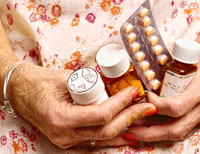En español | If your medicine cabinet is filled with prescriptions and other medications you no longer use, Saturday, April 30, would be a good day to do some cleaning.
See also: Save money on your meds.
On that day, at locations nationwide from 10 a.m. to 2 p.m., the U.S. Drug Enforcement Administration will be collecting unneeded and expired medicines so they can be disposed of in a safe, legal and eco-friendly way.
See also: Save money on your meds.
On that day, at locations nationwide from 10 a.m. to 2 p.m., the U.S. Drug Enforcement Administration will be collecting unneeded and expired medicines so they can be disposed of in a safe, legal and eco-friendly way.

— Peter Dazeley/Getty Images
Prescriptions and over-the-counter "solid dosage" medications (i.e., tablets and caplets) will be accepted. Intravenous medicines, needles and illicit drugs, such as marijuana or methamphetamines, are not part of this program.
Participants do not need to give their names, and it's advisable to remove identifying information from any pill bottles you turn in.
During the first-ever national drug take-back event, which was held last September, the DEA collected more than 121 tons of pills.
If you're wondering why the DEA is involved, and why you can't just toss your old prescriptions and over-the-counter drugs in the trash, sink or toilet, consider the following:
• Pills that are put in the trash can be easily removed from the garbage by people seeking to illegally use or sell them.
• Medications thrown in the trash can also be found and consumed by children or animals.
• Chemicals and toxins from drugs that are disposed of into landfills, or down toilets and sinks, can escape into the ground and groundwater, polluting the environment and posing health hazards to humans, plants and wildlife. (That said, the Food and Drug Administration does keep a short list of drugs that should be disposed of by flushing them down the toilet.)


No comments:
Post a Comment